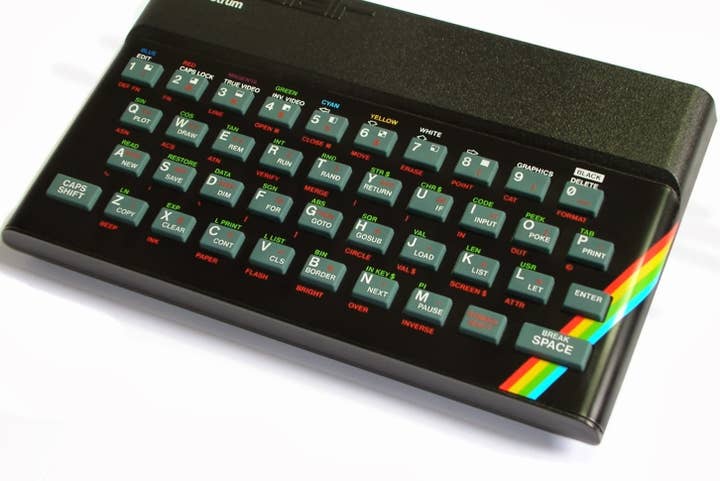Keyboards, Kickstarter and Copyright Law: Elite Systems under fire
Why unpaid developers are asking the public not to buy their games
On Friday January 31, a Bluetooth keyboard from veteran UK publisher Elite Systems based on the Sinclair ZX Spectrum computer was funded on Kickstarter. The campaign was a success, but the final hours were mired in controversy after it was claimed that many of the developers whose 8-bit games feature in the associated emulator app had never received agreed royalties.
The deals in question date back to 2010, when Elite launched the first of its ZX Spectrum iOS apps. Original Spectrum games were sold both as in-app purchase bundles within the Elite Collection app, and in certain cases as standalone apps in their own right. The games have also featured in Android and Windows Phone versions of the emulator. The Elite Collection was also a key part of the Kickstarter campaign, with copies and in-app credit being offered as part of reward tiers and the Bluetooth keyboard itself only guaranteed to work with Elite's app.
Yet according to many of the developers whose games make up the Elite Collection, they have never been paid. Some claim to have had no contact from Elite since signing their deal several years ago and at least one insists he never gave permission for his games to be sold at all. All told, 14 Spectrum developers put their names to a joint statement posted on the Kickstarter page stating their case: "We ask you to not purchase any Elite product that either includes any of our games or supports IAPs of them."
Among those putting their name to the statement were well known names such as Jon Ritman (Match Day, Head Over Heels), David Jones (Finders Keepers), Ian Stewart (Gremlin Graphics), Costa Panayi (TLL, Highway Encounter), Julian Gollop (Chaos, Laser Squad); Mike Lewis (Redhawk), Sandy White (Ant Attack), Steve Wetherill (Odin Computer Graphics) and Stephen Crow (Starquake). Modern Spectrum developers such as Bob Smith and Cronosoft, who have self-published titles for the computer in recent years, also signed having licensed their games to Elite.
"The most recent available accounts show Elite had debts of £81k against a net worth of just £5.2k"
The scandal deals a serious blow to Elite Systems, one of the UK's oldest independent games publishers. Elite Systems was founded in 1984 by Richard Wilcox. His brother Steve, now company director, handled sales and marketing at the time. The company quickly came to specialise in home computer ports of popular arcade games, such as Paperboy and Ghosts N' Goblins, as well as titles licensed from US TV shows such as Airwolf and The Fall Guy. The company entered a voluntary arrangement to avoid bankruptcy in 1999, and completed that arrangement in 2006. The most recent available accounts show Elite had debts of £81k against a net worth of just £5.2k.
GamesIndustry.biz has seen correspondence and documentation from 2010 in which Elite Systems offered developers a royalty rate of 50 per cent on the gross profit per sale, with no minimum payment amount and the promise of quarterly sales reports and royalty statements. The licenses granted were non-exclusive, and run for a period of five years, but signatories were asked to enter into a "gentlemen's agreement" not to license the games in question to rival emulator apps.
"On the basis of this quarter's data we estimate that the market for ZX Spectrum games for iOS devices is worth in excess of US$150,000 per annum," reads a sample sales report sent to a prospective licensor. "Consequently we're hopeful that we'll be able to report and pay revenues to you for several quarters (and perhaps even several years) to come." GamesIndustry.biz has also seen emails in which it is suggested the developer could expect "probably a four-figure sum per quarter."
Whether those predictions were accurate is something of a mystery. "All we received were just two quarterly sales reports, the last being in August 2011," Simon Ullyatt of Cronosoft told us. "Unfortunately, we haven't received a single penny in royalty payments for the games that were sold."
His story is repeated by all the developers involved. In fact, none of the developers contacted by GamesIndustry.biz have ever received any royalties, even though their games remained on sale via Elite's app. Nor is this the first time Elite has tripped up on rights issues. In 2012, the company released a mobile remake of the classic joystick-waggler Daley Thompson's Decathlon. "Elite actually launched that game without my permission and without the official licence," Thompson later told Pocket Gamer. "It asked if I wanted to be involved in the project and I declined. Elite just went ahead and published it, anyway." Elite's app was later renamed Brian Clay's Decathlon.

Elite Systems did not immediately respond to interview requests, but did post in the comments of its Kickstarter page, promising to address the complaints in an update. That update came as the campaign entered its final hours some £5000 past its funding goal.
"We wish to assure all of the appeal's backers, including the game developers that have posted, that having been in business for 30 years we take our contractual relationships most seriously," it read. "We urge the game developers to set out any issues which they wish to be addressed in writing and send them to us directly, using the email address below. We will then investigate and respond in writing and in detail and if able to do so will place our response in the public domain."
"For the avoidance of doubt, any and all game developers with whom Elite has a contractual relationship will be paid," read the company's final update before funding closed at £63,194.
Elite's Steve Wilcox responded to our inquiries the following day, directing our attention to a statement posted on Elite's own homepage. In the statement, Wilcox announced that the Elite Collection apps had been voluntarily withdrawn from the App Store while he dealt with developer's complaints. "The public statements are far too wide wide-ranging to be addressed in this single response," reads the post. "However I acknowledge that I, as a Director, have failed in my duty to ensure that some of the reports and some of the payments - due to the ZX Spectrum game developers, with whom Elite has contractual relationships - were made in accordance with the agreed terms. I am working toward that unacceptable position being remedied within the next 28 days, sooner if possible."
The announcement does not seem to have satisfied the developers, however. "I can only imagine this is a desperate measure designed to protect his Kickstarter fund," says Rob Bowkett. "It's plainly ridiculous asking us to report our complaints. He knows only too well what they are. The agreements we signed are void because he has for three years failed to honour their terms. He is in breach of copyright; plain and simple."
It's a sorry state of affairs for retro gaming, and will have done little to convince those who own the rights to vintage software that there's a stable commercial market for their product. The industry has long had a problematic approach to maintaining the market credibility of its earliest products, often stemming from the somewhat anarchic cottage industry roots and complicated by endless mergers and takeovers from one publisher to the next, with many IPs now in legal limbo where nobody is sure who owns what. Too easily, the assumption then becomes that all vintage games are essentially public domain, unless someone makes a fuss. In that sense, Elite is to be credited for at least seeking out the original rights owners, but its subsequent mishandling of their business will rightfully raise eyebrows.
"The industry has long had a problematic approach to maintaining the market credibility of its earliest products"
For fans, too, the situation is an ugly one. Many will have been happy for the chance to buy these games anew, and support the original creators after years of playing them via legally murky ROMs. "I'm still feeling like I have a bad taste left in my mouth after all this," posted one backer on the Elite Kickstarter page when the controversy broke. "If what's being said in these comments is true, it makes me angry but more importantly very, very sad that I not only backed this but during the course also raised my pledge too," posted another. The sentiment will likely be shared by many who downloaded games via the Elite apps over the last three years.
GamesIndustry.biz asked Alex Chapman of Sheridan's Solicitors' specialist games team to cast a legal eye over the claims being made. "The question is was the app infringing?" he says. "I think that is a fairly easy question to answer based on the facts we've seen. The potential claimants (rights holders) fall into two categories - those who have granted a licence to Elite but haven't been paid and those who didn't grant a licence at all."
"The second category is easy," he continued. "Elite's use is copyright infringement. In fact if it is on a commercial scale and Elite knew or should have known that it was infringing third party rights then arguably it could be a criminal offence."
"The first category is less straightforward but ultimately I'd say Elite's use is also copyright infringement because the licence should be deemed conditional on payment being made and so if payment isn't made the licence is imperfect. Of course it could be perfected if they are paid. I'm told the contract has a cure period before it can be terminated. That may impact on the rights holders' position and so we probably need more facts before being definitive. However in the circumstances I'd say the continued exploitation of many of these games would infringe their owner's rights. Even though the app is down, that isn't the end of the story - the rights holders still need paying - and that is also something that can be dealt with fairly easily especially if they group together."
Several of the developers involved have contacted us to announce that they indeed plan to press ahead with their combined case, taking it directly to Apple and Kickstarter. The Bluetooth ZX Spectrum is due to be delivered to backers in September of this year.









